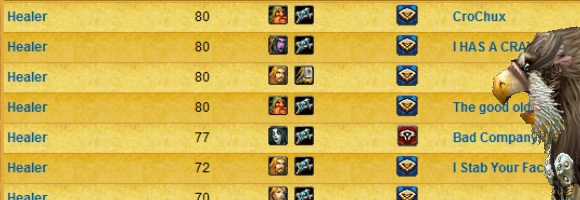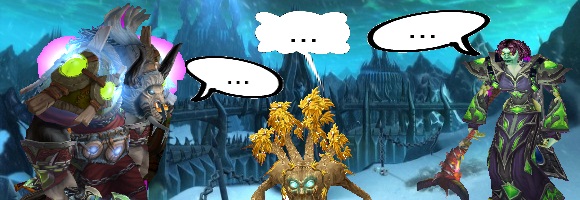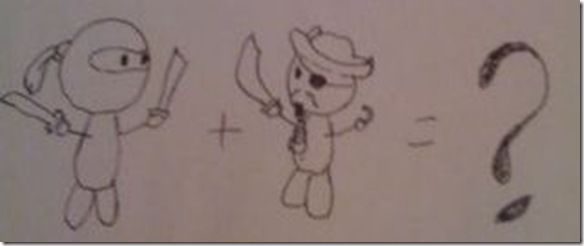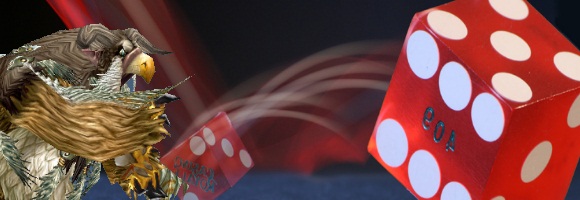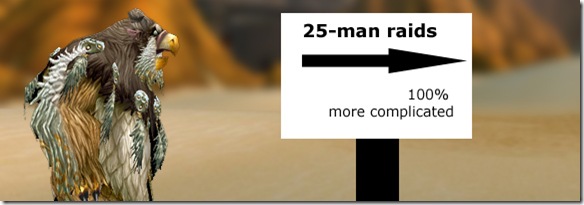Hello, my name’s druid and I’m a PUGger.
That might as well be my name – or yours. We’ve all been privvy to it: “Druid go tank” “warrior u nub pala tank” “priest dead other priest heal”. Addressing someone by their class rather than their character’s name is rude, it’s lazy, and it’s adding to the stagnation in WoW’s pond.
We give our characters names for a reason. It helps us differentiate our character from the millions of other blue-haired and glowy-eyed sacks of muscle. Everyone has a different method for choosing names – I know some people just mash the keyboard until something looks good. For me, choosing a character’s name is an involved process requiring an etymological dictionary, babynames sites and a chunk of time staring at the character creation screen.
A name is part of an identity. In WoW it’s the only thing that we can tailor to be completely unique. It’s more important for some players; for role players names are part of an entire personality. But we all name our characters and I’d bet it’s not just role players who agonize over hitting the Right Name. I do and it’s just because I like to give my lil’uns a starting point, like a header for a clean slate starting at level 1.
It’s disrespectful to not acknowledge the thought and identity we put into naming characters. Yet in WoW I rarely see people use names in social situations where they have no attachment to people. I’m talking about random groups; it’s painfully obvious that anyone inclined to call by class name will do so in a group full of strangers. But why?
Imagine a paladin named Spongebob. He runs 5 to 25 man PUGs and uses character names as little as possible. The first and most obvious reason is that he doesn’t have time to check a name. Things can get hairy in group content; if the death knight is about to become a bubbling heap on the floor it’s reasonable for Spongebob to yell “DK move out of fire”. But if the death knight is in no more imminent danger than getting toasty-warm toes, Spongebob doesn’t really have any excuse not to check and type his name.
Granted, the Death Knight might have a long and well considered name like “Enginescannae”. You know, one that’s a mile long. But that’s where just typing the first few letters of the name works wonders. Just a quick “Hey Takeitjim Engi, fire move!” acknowledges the death knight’s name and communicates clearly.
Ah, communication. That is why using names is practically crucial. If someone needs to do something right the nitwibble now then letting them know using their character name gets that across perfectly. Using a class name can come across as confusing, particularly if it’s spelt wrong – the amount of times I’ve read “durid do X” and thought “which one is durid? can’t see anyone by that nam… oh! Me!” Not to mention the fun to be had by saying “shaman go heal” when there are multiples of that class in the party.
Of course, at the dark, murky heart of the issue is the fact that PUGs mean strangers. Spongebob’ll probably never see the party or raid members again, particularly in 5 mans. He can afford to be lazy; why bother putting the effort in to be social? He might even occasionally look at other players like they’re the local armour repair vendor.
Being with strangers also means there can be what I call a Pecking Order Issue. Chaos can ensue unless boundaries and/or hierarchy are stated and accepted. The tank is traditionally top of the pecking order in 5 mans, but frankly that hierarchy is obselete and most players ignore it. In 10 and 25 man PUGs the hierarchy can be shaky or non-existent if the raid leader isn’t capable of holding things together or setting boundaries.
Now, Spongebob may be a player who needs a Pecking Order; perhaps that’s what he’s used to with his guild or in real life. He may also be a player who likes to be at the top of that Pecking Order and perhaps doesn’t feel he gets to be often enough. Telling the priest to “go heal” removes the priest’s choices in playstyle and identity, lumping them into a faceless group. It also asserts Spoongebob as the authority or arbiter. It’s like saying “oi black haired person go play the violin cos I say so.” Quite often it’s meant as a challenge, and if no-one speaks out against it then it becomes status-quo for the run. Spongebob will take it as freedom to act and talk how he likes – and no-one likes a bully.
I’m not going to spend hours saying that random dungeons or PUGs are a good or bad thing and they’re making the social aspect of the game worse. What I have said, and I stand by like a hairdresser with a maniacal glint and blue hairspray, is that making a statement using names wouldn’t kill us. It might just remove some of the ridiculous schoolyard-like standoffs and get WoW’s social pond flowing freely.
What do you think? Do you get annoyed by class names being used, and if so how do you react? Or do you think it’s fine, perhaps use class names often yourself? Do you think it matters in the name of ettiquette, or do you think it’s just an unimportant habit in a game?
This is an article by Mimetir, an owl (and resto shaman) of a raid leader on The Venture Co. (EU) You can find my twitter feed here.
